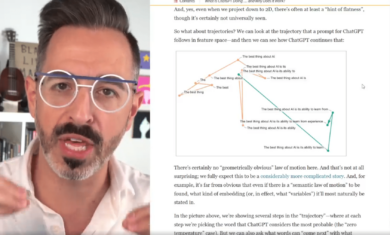The pace of content on the internet already seems to be at a blistering speed. Twitter sees roughly 350,000 tweets per minute. Users watch roughly 4.5M YouTube videos every minute. Add in other social networks like Facebook, Instagram and TikTok, and the numbers are unreal.
With that we haven’t even talked about web content. Sites are churning out tons of content, and roughly 250,000 new websites are created every day.
Despite those huge numbers, things are likely to skyrocket fro there in the next few years. I talked a bit about AI-generated art recently, but we’re also seeing a lot more AI-generated text, videos, and all kinds of content. As those systems smooth out and scale, content will be churning from everywhere you look.
So what can we do?
I’m not sure I have the answer, but I have some ideas. My first thought is that it may not be as bad as it sounds. Even if content goes 10x in the next few years, it doesn’t mean that you need to see it. I mentioned above that there are 350,000 new tweets every minute, but I only follow who I want to follow. If people are publishing too frequently for my taste or it’s just spam, I can stop following them. Scale doesn’t hurt me there.
A potential issue is the growing rise of “recommended” content on social media, but companies will have to keep that in check or risk losing users.
The same goes with web content. Sure there are tons of new sites coming up, but I can choose which sites I want to follow. I talked last year about how I’ve been adjusting my RSS feeds to focus more on people, and I continue to streamline from there. RSS is a bit messy at times, but it’s a way to get exactly the content you want, with no extra recommendations and no ads. It’s quite amazing.
Spam will be trouble
The biggest problem will likely be in two main areass:
Organizing information: Google will need to find new ways to determine what content is real versus written by AI, or perhaps allow AI-generated content if it’s high enough quality. It’ll be interesting to see what they do there. Social networks will have similar challenges, as bots will become more and more humanlike as time goes no.
Is it real? AI art, photos and movies will make it very hard to tell. We’re not far from people being able to create realistic video, with realistic voices, making it look like anyone is saying and doing anything they want. News organizations will have to find new ways to validate the truth, and I don’t know what that even looks like. This will be a real struggle in the coming years, and I’m excited to see what kind of technologies come along to help fight it.
What’s next?
Personally, I’m not too worried about how I’ll dig through the mess. I trust that social networks will keep things fairly tight (at the risk of losing users), and I’ll keep using RSS for much of my reading. My bigger concern is around fake content being passed around as if it were real, which we already see too much of today, so we’ll see what answers are created to stop it.




